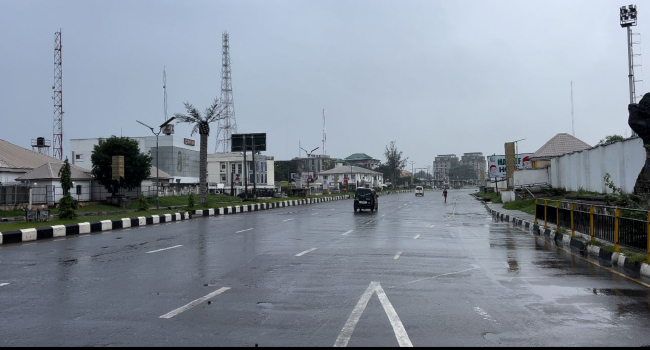Sani, Wike, and Others Are Given An Ultimatum By SERAP To Explain N5.9trn, $4.6bn in Loans
The 36 state governors of Nigeria as well as Mr. Nyesom Wike, the minister of the Federal Capital Territory (FCT), have been given a week’s notice by the Socio-Economic Rights and Accountability Project (SERAP) to provide loan agreements and expenditure reports for the approximately N5.9 trillion and $4.6 billion in loans that their states and the FCT have received.
The locations and specifics of the projects carried out with the loans are also included in SERAP’s request.
Additionally, SERAP asked them to “immediately invite the Economic and Financial Crimes Commission (EFCC) and the Independent Corrupt Practices and Other Related Offenses Commission (ICPC) to investigate the spending of the domestic and external loans obtained by your state and the FCT.”
SERAP’s appeal came after Kaduna State Governor Uba Sani revealed last week that the state was unable to pay salaries because of $587 million in debt, N85 billion in outstanding bills, and 115 contractual liabilities from Nasir El-Rufai’s previous administration.
The organization stated in the Freedom of Information requests dated March 30, 2024, and signed by Kolawole Oluwadare, deputy director of SERAP:
“Publication of loan agreements and information about the use of obtained loans is in the public interest.”
Nigerians have a right to know how their states are using the federal and foreign loans that their governors have secured, according to SERAP.
According to SERAP, “publicly disseminating copies of loan agreements and expenditure details of the loans obtained would guarantee that individuals holding public office are accountable to the public for carrying out their duties in the administration of public funds.”
“We would be grateful if the recommended measures are taken within seven days of the receipt and/or publication of this letter,” one section of the FOI requests stated.
The claims that numerous states and the Federal Capital Territory (FCT) in the country are mismanaging public finances, including loans from bilateral and multilateral organizations and agencies, are a cause for grave worry for SERAP.
“The ultimate goal of strengthening the rule of law is to increase accountability, prevent corruption, and build trust in democratic institutions. Transparency in the spending of the loans obtained by your state is fundamental to achieve these goals.”
The 36 states of Nigeria as well as the Federal Capital Territory have a combined public domestic debt portfolio of N5.9 trillion, according to the Debt Management Office. The portfolio of public external debt is $4.6 billion in total.
SERAP has issued an ultimatum to Sani, Wike, and others, demanding an explanation for the alleged misappropriation of N5.9 trillion and $4.6 billion in loans. The organization has requested a formal response within a specified timeframe.
“Publishing copies of the loan agreements obtained by your state and the FCT would allow Nigerians to scrutinise them, and promote transparency and accountability on the spending of public funds including the loans obtained.”
Salaries and pensions for civil servants are allegedly owed by several states and the Federal District of Columbia. To cover salary, several states are taking out loans. Access to essential public goods and services, like high-quality healthcare and education, is still denied to millions of Nigerians who live in your state and the Federal Capital Territory.
“Public funds, including loans from domestic and foreign sources, are reportedly being used by several states, including yours, to finance needless trips, purchase expensive and bulletproof vehicles, and generally support the extravagant lifestyles of politicians.”
“SERAP is very concerned that corruption and poor management may occur with the internal and foreign loans that your state and the Federal Capital Territory have secured. Your state’s loan expenditures must be transparent and accountable, and it is the duty of your administration to make sure of that.
“SERAP believes that providing and widely publishing the details of the spending of the domestic and external loans obtained by your state and the FCT would enable Nigerians to effectively and meaningfully engage in the management of the loans.”
“SERAP believes that the constitutional principle of democracy also provides a foundation for Nigerians’ right to know the details of loan agreements and how the loans obtained are spent. Citizens’ right to know promotes openness, transparency, and accountability that is in turn crucial for the country’s democratic order.”
“The effective operation of representative democracy depends on the people being able to scrutinize, discuss and contribute to government decision making, including on the spending of loans obtained by your state and the FCT.”
people need knowledge to do this so people may engage in the administration of public finances by their state government and the Federal Capital Territory more efficiently.
“Any privacy or other interests are outweighed by the public’s need to know about spending connected to the loans your state secured. Furthermore, the supervision provided by the public’s access to these facts would operate as a crucial check on your state’s operations and aid in the prevention of abuses of the public trust.
“SERAP is worried about the high possibility of financial mismanagement or diversion associated with loans taken out by state governments, including your state. In general, the public cannot see the financial records of the 36 states of Nigeria or the Federal Capital Territory.
Your state has obligations under international anticorruption and human rights law, including a responsibility to promote transparency and accountability in the management of public funds, prevent mismanagement or diversion of public funds, and redress any abuse of public trust.”
“The Nigerian Constitution, human rights and anticorruption treaties to which Nigeria is a state party also impose obligations on your state to prevent mismanagement or diversion of public funds including the loans obtained.”
“SERAP is seriously concerned that years of allegations of corruption and mismanagement of public funds including the loans obtained by states have contributed to widespread poverty, underdevelopment and lack of access to public goods and services.
The public interest and citizens’ basic interests have continued to be negatively impacted by opacity in the use of state-obtained loans.
Transparency will boost public confidence that these loans are used and that any future loans will help Nigerians living in your state. It would also ensure that these loans are not siphoned into private wallets.
Everyone has the right to information, including details about loan agreements and the use of acquired funds, according to the Freedom of Information Act, Section 39 of the Nigerian Constitution, Article 9 of the African Charter on Human and Peoples’ Rights, and Article 19 of the International Covenant on Civil and Political Rights.
“Your state has clear legal obligations to provide the information as prescribed by provisions of the African Charter on Human and Peoples’ Rights (Ratification and Enforcement) Act and the Nigerian Constitution 1999 [as amended]. Your state cannot use the argument that the Freedom of Information Act does not apply to your state to refuse to provide the details being sought.



